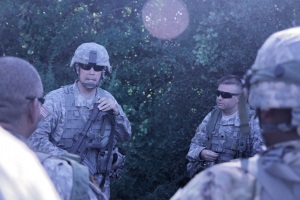Accomplishing the mission at all levels
Story By: Staff Sgt. Jennifer Atkinson
Posted On: Aug. 17, 2016
 Photo By Staff Sgt. Jennifer Atkinson | Soldiers from the 836th Engineer Co. (Sappers) conduct training on fundamental Soldier skills during Troop Leading Procedure lanes at the 136th Maneuver Enhancement Brigade Exportable Combat Training Capability exercise at Ft. Hood, Texas, August 9-14. . TLP lanes reinforce proficiency in medical, communications, and weapons tasks, ensuring Minuteman Soldiers are combat ready. (U.S. Army photo by Staff Sgt. Jennifer D. Atkinson/Released)
Photo By Staff Sgt. Jennifer Atkinson | Soldiers from the 836th Engineer Co. (Sappers) conduct training on fundamental Soldier skills during Troop Leading Procedure lanes at the 136th Maneuver Enhancement Brigade Exportable Combat Training Capability exercise at Ft. Hood, Texas, August 9-14. . TLP lanes reinforce proficiency in medical, communications, and weapons tasks, ensuring Minuteman Soldiers are combat ready. (U.S. Army photo by Staff Sgt. Jennifer D. Atkinson/Released)
The success of the Army relies on strong leaders and skilled Soldiers to carry out their plans. For Soldiers of the 136th Maneuver Enhancement Brigade, this year's annual training at Ft. Hood, Texas, offered the chance to improve proficiency in both.
“Col. [Scott] Mac Leod and I were talking about some of the needs we identified at the platoon sergeant and platoon leader level,” said Sgt. Maj. Michael Terzian, the brigade operations sergeant major, “and we wanted to give them the tools to better prepare for the operations we work on.”
At the small unit levels, such as companies and platoons, leaders trained on troop leading procedures, a series of steps laid out to ensure no part of a planning a mission is neglected or forgotten, from receiving the mission to supervising and refining the training. Each step takes into account some aspect of the battle space that may affect the mission, including weather, movement, enemy, and support, and will affect even the smallest team of the organization.
“Right now, we're in the planning stage of the mission,” said Staff Sgt. Sampson Mejia, a squad leader for 3rd platoon, 836th Engineer Co. (Sappers). “We're gathering information, so we can push it out to the joes, and they can start preparing for the situation. We go through everything that's mission essential- light and weather data, our timeline, friendly and enemy units, and sustainment- our beans and bullets.”
TLPs are done at leadership levels, but the tasks are executed at the Soldier level and require precise knowledge of Soldier skills. To fulfill this requirement, Terzian scheduled warrior task training lanes for the enlisted members of the brigade.
“TLP is the process by which units prepare for training the following day,” said Terzian. “So we decided to run warrior training lanes concurrently, to give individual Soldiers something to work on, and make sure, as a platoon, all the Soldiers were involved.”
Warrior Task Training refers to skills taught in Basic Combat Training deemed critical to survival. Out of the 15 categories of WTT, “we picked four of them,” said Terzian, “and used the model of shoot, move and communicate, as well as taking care of your buddy.”
The four lanes selected for this training were performing a functions check on the M4 carbine, employ hand grenades, evaluate a casualty, and perform voice communications.
“I'm running the M4 task lane. Soldiers are clearing, disassembling, reassembling, and performing a functions check on the weapon,” said Sgt. James D. Patty, Headquarters and Headquarters Co., 136th Military Police Battalion. “Most of them are knocking it out in 30 seconds to a minute.”
Although Patty is a mechanic, he enjoyed sharpening his fundamental skills, as well as teaching other Soldiers.
“For me, being out here to teach the M-4 is completely new,” he said. “I like doing new stuff, and our [military occupation specialty] isn't what we're teaching right now, so to come out here, relearn [a skill] and then teach it, it's very cool.”
This type of training is also a lot of bang for the buck, said Terzian, and continues the effort to promote good financial stewardship by the Texas Army National Guard.
“Surprisingly, this required very little money but was a big hit with the soldiers,” said Terzian, “so it goes to show that money is not the key ingredient to good training.”
The collaborative efforts of the troop leading procedures and the warrior task training units ensures Soldiers at all levels are prepared to execute their mission, whether stateside or abroad.
“Over the last 10 years, our units have done a lot of deploying, and we're good at it, but some of these skills are a little rusty.” he said. “This is a good opportunity to refresh those skills and build that foundation.”